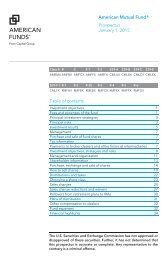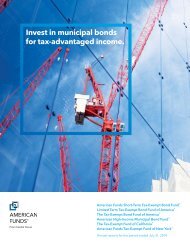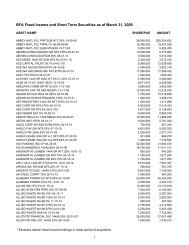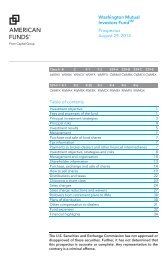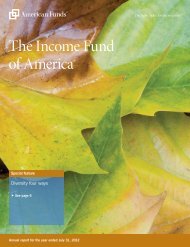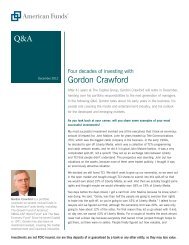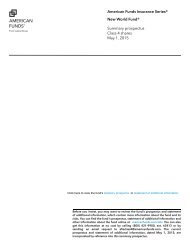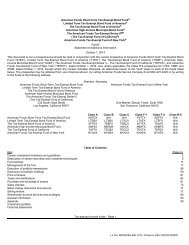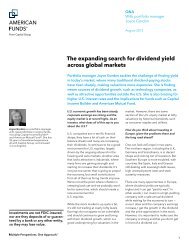Obligations backed by the “full faith and credit” <strong>of</strong> the U.S. government — U.S. government obligations include the followingtypes <strong>of</strong> securities:U.S. Treasury securities — U.S. Treasury securities include direct obligations <strong>of</strong> the U.S. Treasury, such as Treasury bills,notes and bonds. For these securities, the payment <strong>of</strong> principal and interest is unconditionally guaranteed by the U.S.government, and thus they are <strong>of</strong> high credit quality. Such securities are subject to variations in market value due t<strong>of</strong>luctuations in interest rates, but, if held to maturity, will be paid in full.Federal agency securities — The securities <strong>of</strong> certain U.S. government agencies and government-sponsored entities areguaranteed as to the timely payment <strong>of</strong> principal and interest by the full faith and credit <strong>of</strong> the U.S. government. Suchagencies and entities include The Federal Financing Bank (FFB), the Government National <strong>Mortgage</strong> Association (GinnieMae), the Veterans Administration (VA), the Federal Housing Administration (FHA), the Export-Import Bank (Exim Bank), theOverseas Private Investment Corporation (OPIC), the Commodity Credit Corporation (CCC) and the Small BusinessAdministration (SBA).Other federal agency obligations — <strong>Additional</strong> federal agency securities are neither direct obligations <strong>of</strong>, nor guaranteed by, theU.S. government. These obligations include securities issued by certain U.S. government agencies and government-sponsoredentities. However, they generally involve some form <strong>of</strong> federal sponsorship: some operate under a government charter; some arebacked by specific types <strong>of</strong> collateral; some are supported by the issuer’s right to borrow from the Treasury; and others are supportedonly by the credit <strong>of</strong> the issuing government agency or entity. These agencies and entities include, but are not limited to: FederalHome Loan Bank, Federal Home Loan <strong>Mortgage</strong> Corporation (Freddie Mac), Federal National <strong>Mortgage</strong> Association (Fannie Mae),Tennessee Valley Authority and Federal Farm Credit Bank System.On September 7, 2008, Freddie Mac and Fannie Mae were placed into conservatorship by their new regulator, the Federal HousingFinance Agency (“FHFA”). Simultaneously, the U.S. Treasury made a commitment <strong>of</strong> indefinite duration to maintain the positive networth <strong>of</strong> both firms. As conservator, the FHFA has the authority to repudiate any contract either firm has entered into prior to FHFA’sappointment as conservator (or receiver should either firm go into default) if the FHFA, in its sole discretion determines thatperformance <strong>of</strong> the contract is burdensome and repudiation would promote the orderly administration <strong>of</strong> Fannie Mae’s or FreddieMac’s affairs. While the FHFA has indicated that it does not intend to repudiate the guaranty obligations <strong>of</strong> either entity, doing so couldadversely affect holders <strong>of</strong> their mortgage-backed securities. For example, if a contract were repudiated, the liability for any directcompensatory damages would accrue to the entity’s conservatorship estate and could only be satisfied to the extent the estate hadavailable assets. As a result, if interest payments on Fannie Mae or Freddie Mac mortgage-backed securities held by the fund werereduced because underlying borrowers failed to make payments or such payments were not advanced by a loan servicer, the fund’sonly recourse might be against the conservatorship estate, which might not have sufficient assets to <strong>of</strong>fset any shortfalls.The FHFA, in its capacity as conservator, has the power to transfer or sell any asset or liability <strong>of</strong> Fannie Mae or Freddie Mac. TheFHFA has indicated it has no current intention to do this; however, should it do so a holder <strong>of</strong> a Fannie Mae or Freddie Mac mortgagebackedsecurity would have to rely on another party for satisfaction <strong>of</strong> the guaranty obligations and would be exposed to the credit risk<strong>of</strong> that party.Page 6
Certain rights provided to holders <strong>of</strong> mortgage-backed securities issued by Fannie Mae or Freddie Mac under their operativedocuments may not be enforceable against FHFA, or enforcement may be delayed during the course <strong>of</strong> the conservatorship or anyfuture receivership. For example, the operative documents may provide that upon the occurrence <strong>of</strong> an event <strong>of</strong> default by FannieMae or Freddie Mac, holders <strong>of</strong> a requisite percentage <strong>of</strong> the mortgage-backed security may replace the entity as trustee. However,under the Federal Housing Finance Regulatory Reform Act <strong>of</strong> 2008, holders may not enforce this right if the event <strong>of</strong> default arisessolely because a conservator or receiver has been appointed.Inflation-indexed bonds — The fund may invest in inflation-indexed bonds issued by governments, their agencies orinstrumentalities and corporations. The fund has no current intention <strong>of</strong> investing in inflation-index bonds issued by corporations.The principal amount <strong>of</strong> an inflation-indexed bond is adjusted in response to changes in the level <strong>of</strong> the consumer price index.Repayment <strong>of</strong> the original bond principal upon maturity (as adjusted for inflation) is guaranteed in the case <strong>of</strong> U.S. Treasury inflationindexedbonds, and therefore the principal amount <strong>of</strong> such bonds cannot be reduced below par even during a period <strong>of</strong> deflation.However, the current market value <strong>of</strong> these bonds is not guaranteed and will fluctuate, reflecting the rise and fall <strong>of</strong> yields. In certainjurisdictions outside the United States the repayment <strong>of</strong> the original bond principal upon the maturity <strong>of</strong> an inflation-indexed bond isnot guaranteed, allowing for the amount <strong>of</strong> the bond repaid at maturity to be less than par.The interest rate for inflation-indexed bonds is fixed at issuance as a percentage <strong>of</strong> this adjustable principal. Accordingly, the actualinterest income may both rise and fall as the principal amount <strong>of</strong> the bonds adjusts in response to movements <strong>of</strong> the consumer priceindex. For example, typically interest income would rise during a period <strong>of</strong> inflation and fall during a period <strong>of</strong> deflation.Forward commitment, when issued and delayed delivery transactions — The fund may enter into commitments to purchase orsell securities at a future date. When the fund agrees to purchase such securities, it assumes the risk <strong>of</strong> any decline in value <strong>of</strong> thesecurity from the date <strong>of</strong> the agreement. If the other party to such a transaction fails to deliver or pay for the securities, the fund couldmiss a favorable price or yield opportunity, or could experience a loss.The fund may enter into roll transactions, such as a mortgage dollar roll where the fund sells mortgage-backed securities for deliveryin the current month and simultaneously contracts to repurchase substantially similar (same type, coupon, and maturity) securities ona specified future date, at a pre-determined price. During the period between the sale and repurchase (the “roll period”), the fundforgoes principal and interest paid on the mortgage-backed securities. The fund is compensated by the difference between the currentsales price and the lower forward price for the future purchase (<strong>of</strong>ten referred to as the “drop”), if any, as well as by the interest earnedon the cash proceeds <strong>of</strong> the initial sale. The fund could suffer a loss if the contracting party fails to perform the future transaction andthe fund is therefore unable to buy back the mortgage-backed securities it initially sold. The fund also takes the risk that the mortgagebackedsecurities that it repurchases at a later date will have less favorable market characteristics than the securities originally sold(e.g., greater prepayment risk). These transactions are accounted for as purchase and sale transactions, which may increase thefund’s portfolio turnover rate.With to be announced (TBA) transactions, the particular securities (i.e., specified mortgage pools) to be delivered or received are notidentified at the trade date, but “to be announced” at aPage 7
- Page 1 and 2: American Funds Mortgage Fund ®Part
- Page 3 and 4: Description of certain securities a
- Page 5: Mortgages underlying most ARMS, how
- Page 9 and 10: oard of trustees, taking into accou
- Page 11 and 12: Fund policiesAll percentage limitat
- Page 13 and 14: Management of the fundBoard of trus
- Page 15 and 16: Name, age andposition with fund(yea
- Page 17 and 18: Name, age andposition with fund(yea
- Page 19 and 20: Name, age andposition with fund(yea
- Page 21 and 22: Dollar range 1of fundshares ownedAg
- Page 23 and 24: different transfer agent fees and o
- Page 25 and 26: the committee. The nominating and g
- Page 27 and 28: First Clearing, LLCCustody AccountS
- Page 29 and 30: Investment adviser — Capital Rese
- Page 31 and 32: investment adviser may delegate all
- Page 33 and 34: During the 2012 fiscal year, admini
- Page 35 and 36: Following is a brief description of
- Page 37 and 38: Other compensation to dealers — A
- Page 39 and 40: Execution of portfolio transactions
- Page 41 and 42: among the funds and other accounts
- Page 43 and 44: Subject to board policies, the auth
- Page 45 and 46: sales, at the last available bid pr
- Page 47 and 48: Taxes and distributionsDisclaimer:
- Page 49 and 50: countries. The application of the f
- Page 51 and 52: Your bank should include the follow
- Page 53 and 54: Frequent trading of fund shares —
- Page 55 and 56: Sales chargesClass A purchasesPurch
- Page 57 and 58:
Moving between accounts — Investm
- Page 59 and 60:
Shareholders purchasing shares at a
- Page 61 and 62:
life insurance policies that were e
- Page 63 and 64:
Selling sharesThe methods for selli
- Page 65 and 66:
Automatic exchanges — For all sha
- Page 67 and 68:
General informationCustodian of ass
- Page 69 and 70:
Summary prospectuses, prospectuses,
- Page 71 and 72:
Fund numbers — Here are the fund
- Page 73 and 74:
Fund numbersFundClass529-AClass529-
- Page 75 and 76:
Fund numbersFund Class A ClassR-1Cl
- Page 77 and 78:
American Funds Tax-ExemptPreservati
- Page 79 and 80:
Standard & Poor’sLong-term issue
- Page 81 and 82:
Fitch Ratings, Inc.Long-term credit
- Page 83 and 84:
Moody’sCommercial paper ratings (
- Page 85 and 86:
Fannie Mae 6.00% 2042 3 4,040 4,453
- Page 87 and 88:
Tennessee Valley Authority 1.875% 2
- Page 89 and 90:
Federal agency mortgage-backed obli
- Page 91 and 92:
Net assets consist of:Capital paid
- Page 93 and 94:
charge)Classes B and 529-B* None De
- Page 95 and 96:
Thinly traded securities — There
- Page 97 and 98:
Share classadministrative services
- Page 99 and 100:
(1) Includes exchanges between shar
- Page 101:
8/31/2012 10.16 .07 .34 .41 (.16) (



